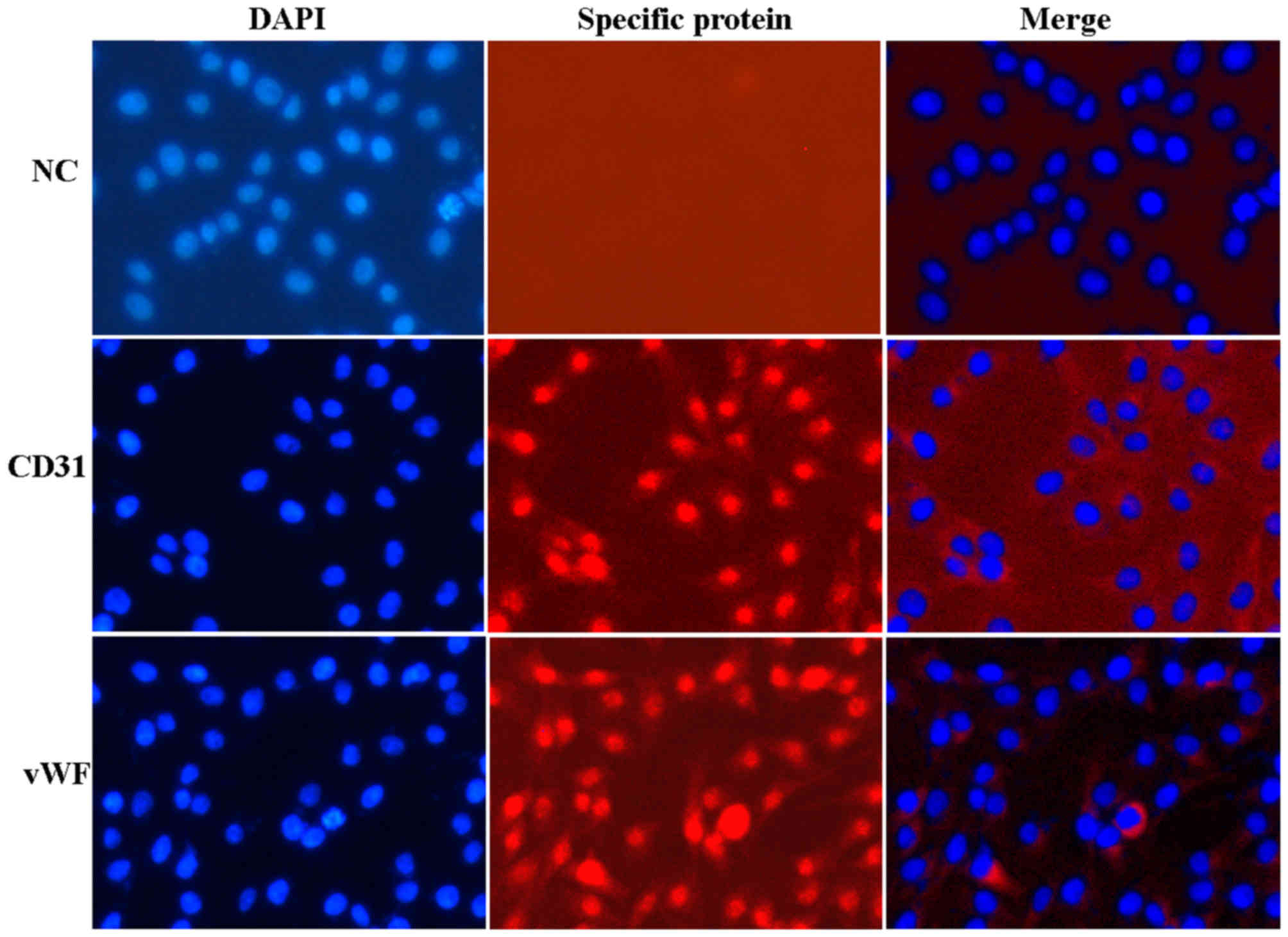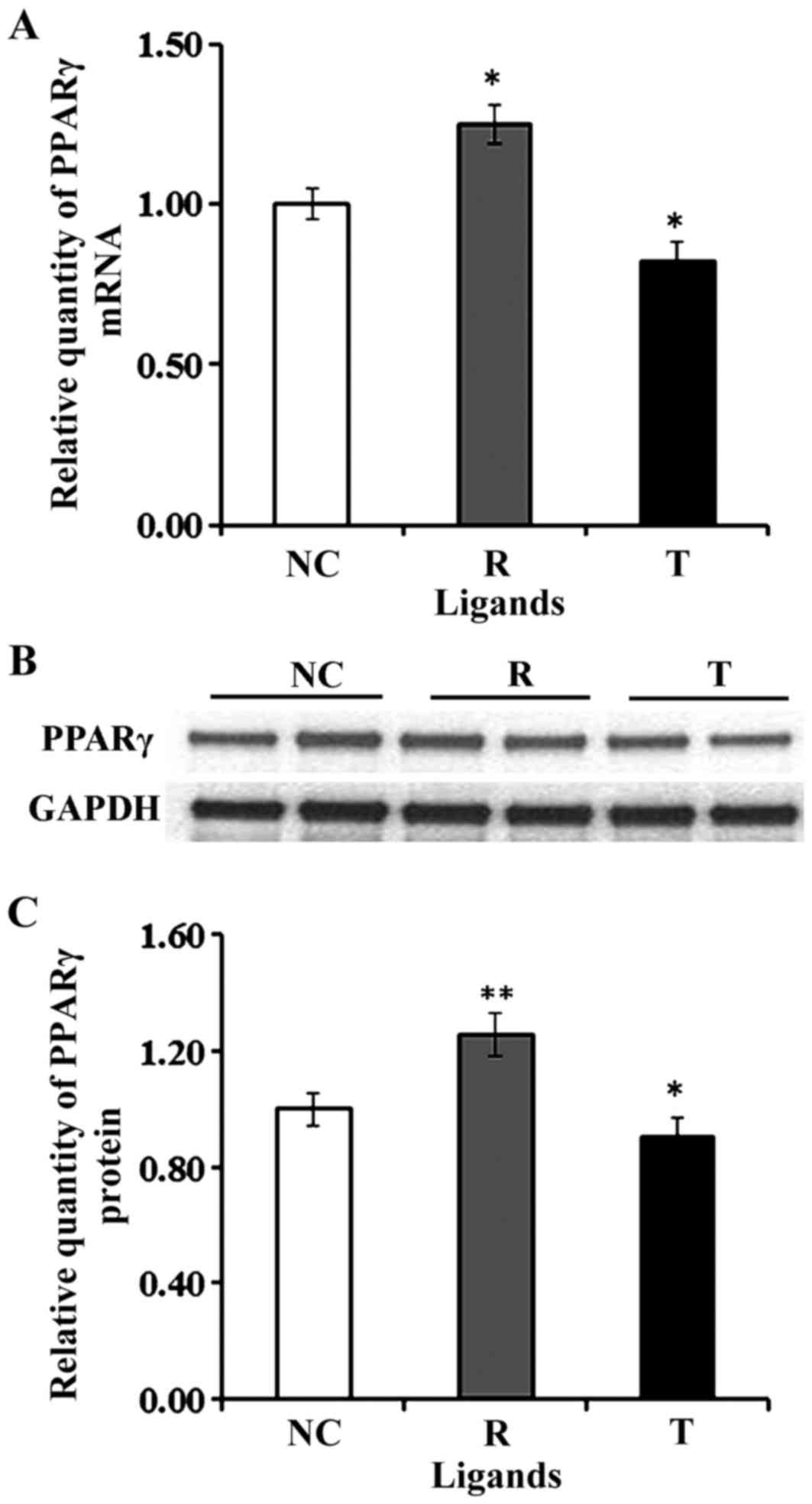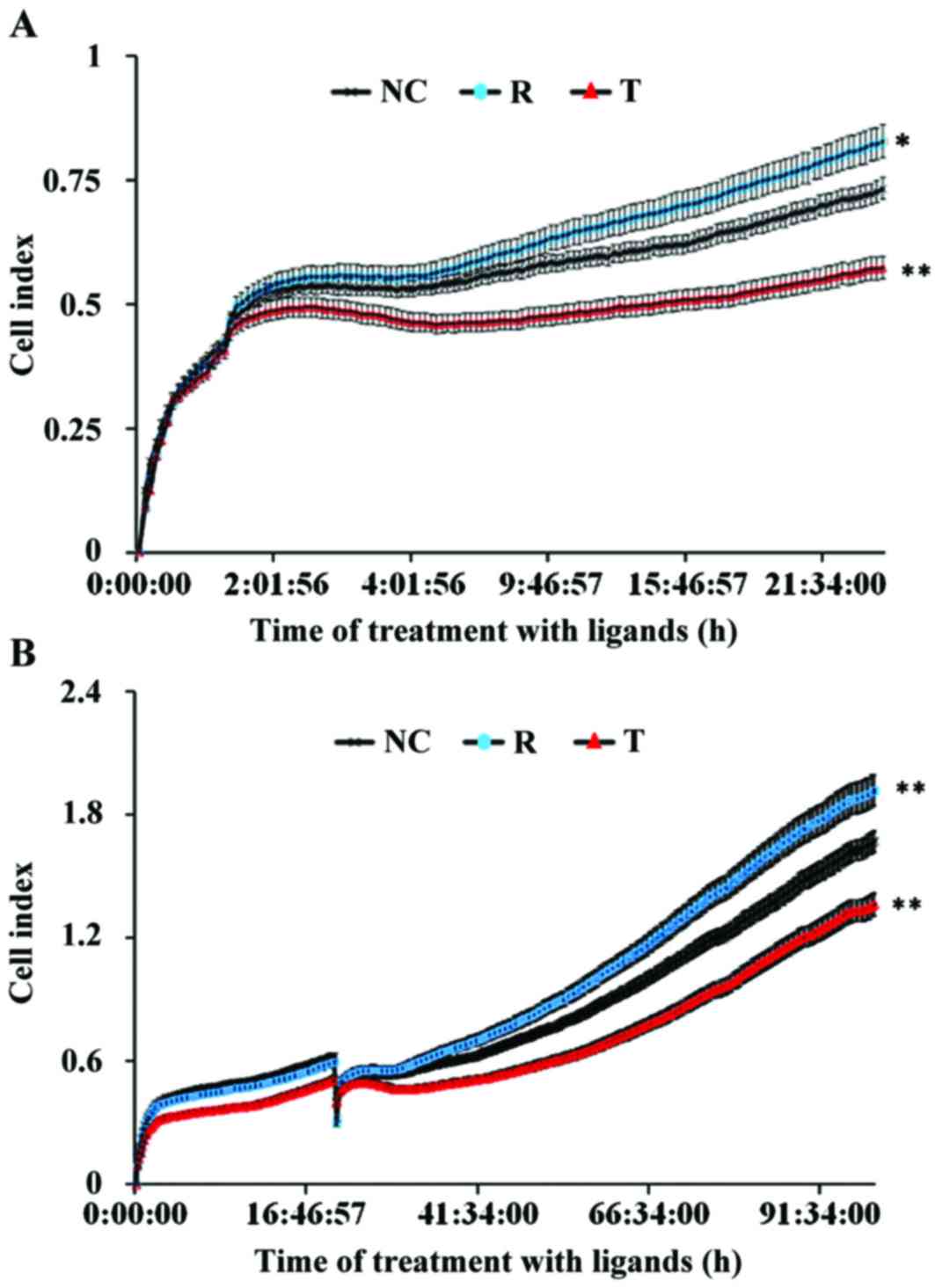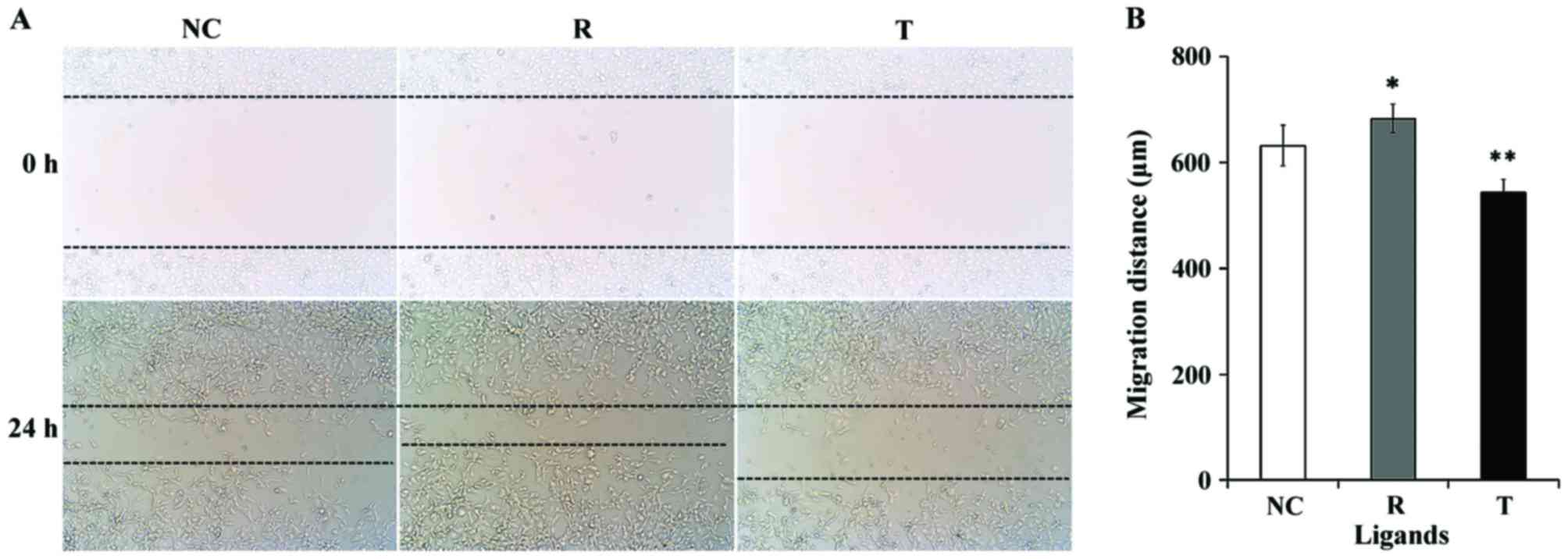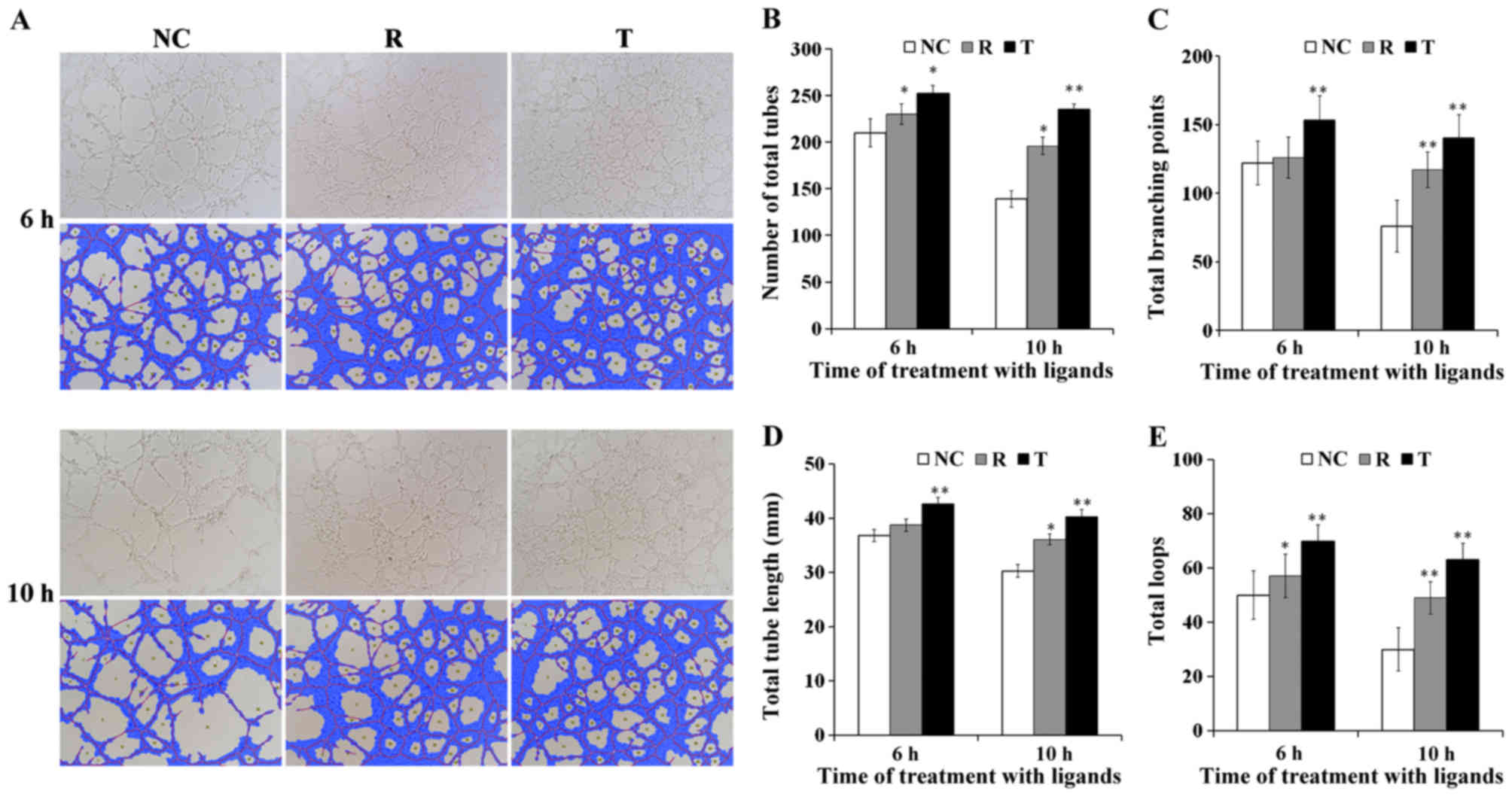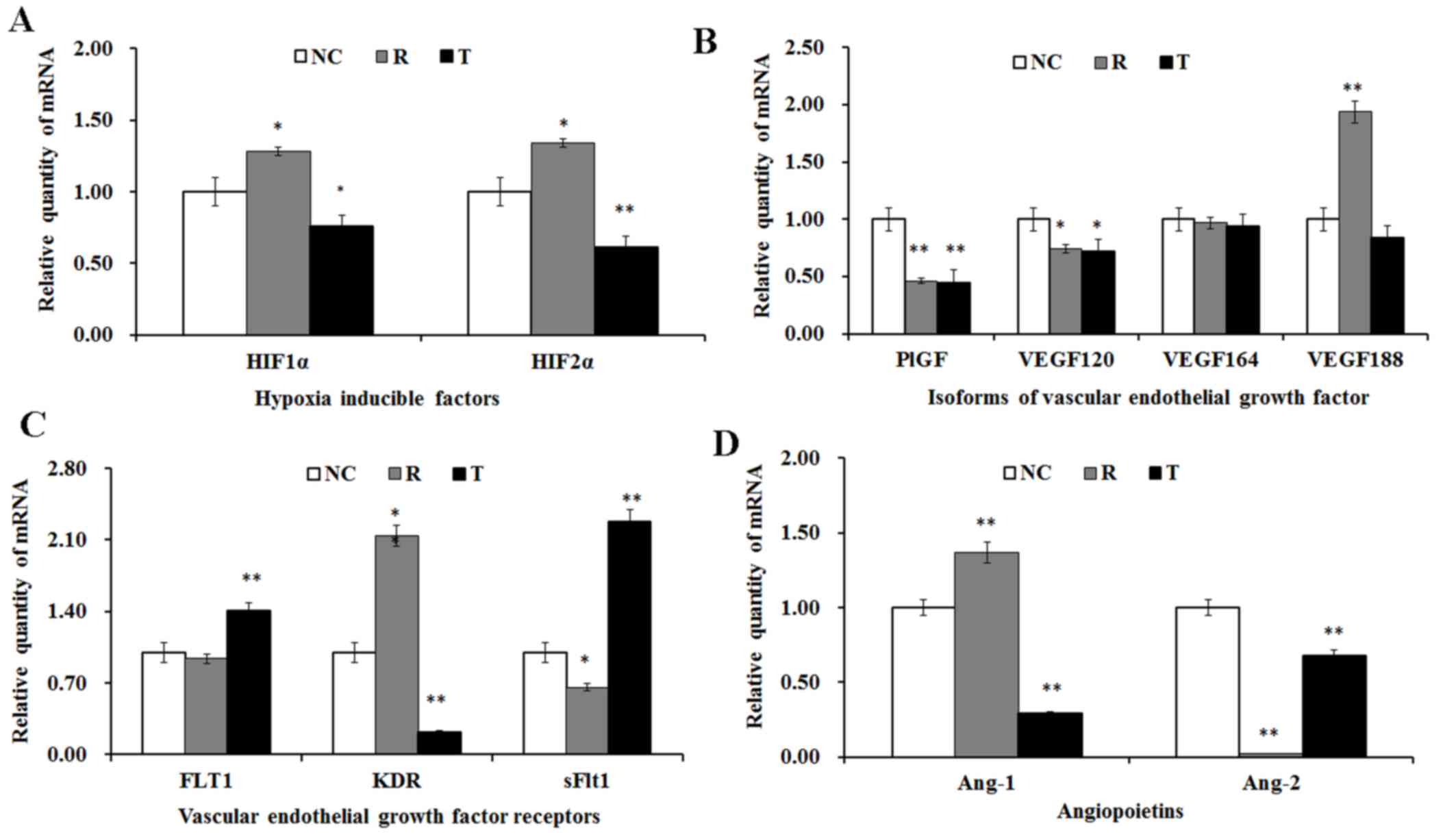|
1
|
Risau W and Flamme I: Vasculogenesis. Annu
Rev Cell Dev Biol. 11:73–91. 1995. View Article : Google Scholar : PubMed/NCBI
|
|
2
|
Risau W: Mechanisms of angiogenesis.
Nature. 386:671–674. 1997. View
Article : Google Scholar : PubMed/NCBI
|
|
3
|
Sato Y, Poynter G, Huss D, Filla MB,
Czirok A, Rongish BJ, Little CD, Fraser SE and Lansford R: Dynamic
analysis of vascular morphogenesis using transgenic quail embryos.
PLoS One. 5:e126742010. View Article : Google Scholar : PubMed/NCBI
|
|
4
|
Charnock-Jones DS, Clark DE, Licence D,
Day K, Wooding FB and Smith SK: Distribution of vascular
endothelial growth factor (VEGF) and its binding sites at the
maternal-fetal interface during gestation in pigs. Reproduction.
122:753–760. 2001. View Article : Google Scholar : PubMed/NCBI
|
|
5
|
Ventureira MR, Sobarzo CMA, Naito M,
Zanuzzi C, Barbeito C and Cebral E: Early placental
angiogenesis-vascularization and VEGF/KDR receptor expression
during mouse organogenesis after perigestational alcohol
consumption. Placenta. 36:4912015. View Article : Google Scholar
|
|
6
|
Saharinen P and Alitalo K: The yin, the
yang, and the angiopoietin-1. J Clin Invest. 121:2157–2159. 2011.
View Article : Google Scholar : PubMed/NCBI
|
|
7
|
Hwang B, Lee SH, Kim JS, Moon JS, Jeung
IC, Lee NG, Park J, Hong HJ, Cho YL, Park YJ, et al: Stimulation of
angiogenesis and survival of endothelial cells by human monoclonal
Tie2 receptor antibody. Biomaterials. 51:119–128. 2015. View Article : Google Scholar : PubMed/NCBI
|
|
8
|
Yancopoulos GD, Davis S, Gale NW, Rudge
JS, Wiegand SJ and Holash J: Vascular-specific growth factors and
blood vessel formation. Nature. 407:242–248. 2000. View Article : Google Scholar : PubMed/NCBI
|
|
9
|
Jiang YZ, Li Y, Wang K, Dai CF, Huang SA,
Chen DB and Zheng J: Distinct roles of HIF1A in endothelial
adaptations to physiological and ambient oxygen. Mol Cell
Endocrinol. 391:60–67. 2014. View Article : Google Scholar : PubMed/NCBI
|
|
10
|
Burton GJ, Charnock-Jones D and Jauniaux
E: Regulation of vascular growth and function in the human
placenta. Reproduction. 138:895–902. 2009. View Article : Google Scholar : PubMed/NCBI
|
|
11
|
Soleymanlou N, Jurisica I, Nevo O, Letta
F, Zhang X, Zamudio S, Post M and Caniggia I: Molecular evidence of
placental hypoxia in preeclampsia. J Clin Endocrinol Metab.
90:4299–4308. 2005. View Article : Google Scholar : PubMed/NCBI
|
|
12
|
Semenza GL: Hypoxia-inducible factors in
physiology and medicine. Cell. 148:399–408. 2012. View Article : Google Scholar : PubMed/NCBI
|
|
13
|
Koch S and Claesson-Welsh L: Signal
transduction by vascular endothelial growth factor receptors. Cold
Spring Harb Perspect Med. 2:a0065022012. View Article : Google Scholar : PubMed/NCBI
|
|
14
|
Vempati P, Popel AS and MacGabhann F:
Extracellular regulation of VEGF: Isoforms, proteolysis, and
vascular patterning. Cytokine Growth Factor Rev. 25:1–19. 2014.
View Article : Google Scholar : PubMed/NCBI
|
|
15
|
Grünewald FS, Prota AE, Giese A and
Ballmer-Hofer K: Structure-function analysis of VEGF receptor
activation and the role of coreceptors in angiogenic signaling.
Biochim Biophys Acta. 1804:567–580. 2010. View Article : Google Scholar : PubMed/NCBI
|
|
16
|
Ng YS, Rohan R, Sunday ME, Demello DE and
D'amore PA: Differential expression of VEGF isoforms in mouse
during development and in the adult. Dev Dyn. 220:112–121. 2001.
View Article : Google Scholar : PubMed/NCBI
|
|
17
|
Nieminen T, Toivanen PI, Rintanen N,
Heikuraa T, Jauhiainena S, Airennea KJ, Alitaloc K, Marjomäkib V
and Ylä-Herttuala S: The impact of the receptor binding profiles of
the vascular endothelial growth factors on their angiogenic
features. Biochim Biophys Acta. 1840:454–463. 2014. View Article : Google Scholar : PubMed/NCBI
|
|
18
|
Huang Y, Zhao B, Liu Y and Wang N:
Peroxisome proliferator-activated receptor gamma regulates the
expression of lipid phosphate phosphohydrolase 1 in human vascular
endothelial cells. PPAR Res. 2014:7401212014. View Article : Google Scholar : PubMed/NCBI
|
|
19
|
Kepez A, Oto A and Dagdelen S: Peroxisome
proliferator-activated receptor-gamma: Novel therapeutic target
linking adiposity, insulin resistance, and atherosclerosis.
BioDrugs. 20:121–135. 2006. View Article : Google Scholar : PubMed/NCBI
|
|
20
|
Nadra K, Quignodon L, Sardella C, Joye E,
Mucciolo A, Chrast R and Desvergne B: PPARgamma in placental
angiogenesis. Endocrinology. 151:4969–4981. 2010. View Article : Google Scholar : PubMed/NCBI
|
|
21
|
Meher A, Sundrani D and Joshi S: Maternal
nutrition influences angiogenesis in the placenta through
peroxisome proliferator activated receptors: A novel hypothesis.
Mol Reprod Dev. 82:726–734. 2015. View Article : Google Scholar : PubMed/NCBI
|
|
22
|
Tache V, Ciric A, Moretto-Zita M, Li Y,
Peng J, Maltepe E, Milstone DS and Parast MM: Hypoxia and
trophoblast differentiation: A key role for PPARγ. Stem Cells Dev.
22:2815–2824. 2013. View Article : Google Scholar : PubMed/NCBI
|
|
23
|
Hasan AU, Ohmori K, Konishi K, Igarashi J,
Hashimoto T, Kamitori K, Yamaguchi F, Tsukamoto I, Uyama T,
Ishihara Y, et al: Eicosapentaenoic acid upregulates VEGF-A through
both GPR120 and PPARγ mediated pathways in 3T3-L1 adipocytes. Mol
Cell Endocrinol. 406:10–18. 2015. View Article : Google Scholar : PubMed/NCBI
|
|
24
|
Cines DB, Pollak ES, Buck CA, Loscalzo J,
Zimmerman GA, McEver RP, Pober JS, Wick TM, Konkle BA, Schwartz BS,
et al: Endothelial cells in physiology and in the pathophysiology
of vascular disorders. Blood. 91:3527–3561. 1998.PubMed/NCBI
|
|
25
|
Zhang J, Xu J, Yang Q, Yuan A, Yang L and
Xue L: Peroxisome proliferator-activated receptor gamma (PPARγ)
expression in pig placenta. Mol Med Rep MMR-8037-156015 in
press.
|
|
26
|
Hong HX, Zhang YM, Xu H, Su ZY and Sun P:
Immortalization of swine umbilical vein endothelial cells with
human telomerase reverse transcriptase. Mol Cells. 24:358–363.
2007.PubMed/NCBI
|
|
27
|
Chrusciel M, Bodek G, Kirtiklis L, Lewczuk
B, Hyder CL, Blitek A, Kaczmarek MM, Ziecik AJ and Andronowska A:
Immortalization of swine umbilical vein endothelial cells (SUVECs)
with the simian virus 40 large-T antigen. Mol Reprod Dev.
78:597–610. 2011. View Article : Google Scholar : PubMed/NCBI
|
|
28
|
Young PW, Buckle DR, Cantello BC, Chapman
H, Clapham JC, Coyle PJ, Haigh D, Hindley RM, Holder JC, Kallender
H, et al: Identification of high-affinity binding sites for the
insulin sensitizer rosiglitazone (BRL-49653) in rodent and human
adipocytes using a radioiodinated ligand for peroxisomal
proliferator-activated receptor gamma. J Pharmacol Exp Ther.
284:751–759. 1998.PubMed/NCBI
|
|
29
|
Zaytseva YY, Wallis NK, Southard RC and
Kilgore MW: The PPARgamma antagonist T0070907 suppresses breast
cancer cell proliferation and motility via both PPARgamma-dependent
and -independent mechanisms. Anticancer Res. 31:813–823.
2011.PubMed/NCBI
|
|
30
|
Dolkart O, Liron T, Chechik O, Somjen D,
Brosh T, Maman and Gabet Y: Statins enhance rotator cuff healing by
stimulating the COX2/PGE2/EP4 pathway: An in vivo and in vitro
study. Am J Sports Med. 42:2869–2876. 2014. View Article : Google Scholar : PubMed/NCBI
|
|
31
|
Koval OA, Sakaeva GR, Fomin AS, Nushtaeva
AA, Semenov DV, Kuligina EV, Gulyaeva LF, Gerasimov AV and Richter
VA: Sensitivity of endometrial cancer cells from primary human
tumor samples to new potential anticancer peptide lactaptin. J
Cancer Res Ther. 11:345–351. 2015. View Article : Google Scholar : PubMed/NCBI
|
|
32
|
Livak KJ and Schmittgen TD: Analysis of
relative gene expression data using real-time quantitative PCR and
the 2(−Delta Delta C(T)) method. Methods. 25:402–408. 2001.
View Article : Google Scholar : PubMed/NCBI
|
|
33
|
Jonkman JE, Cathcart JA, Xu F, Bartolini
ME, Amon JE, Stevens KM and Colarusso P: An introduction to the
wound healing assay using live-cell microscopy. Cell Adh Migr.
8:440–451. 2014. View Article : Google Scholar : PubMed/NCBI
|
|
34
|
Kakiuchi-Kiyota S, Vetro JA, Suzuki S,
Varney ML, Han HY, Nascimento M, Pennington KL, Arnold LL, Singh RK
and Cohen SM: Effects of the PPARgamma agonist troglitazone on
endothelial cells in vivo and in vitro: Differences between human
and mouse. Toxicol Appl Pharmacol. 237:83–90. 2009. View Article : Google Scholar : PubMed/NCBI
|
|
35
|
Murata T, He S, Hangai M, Ishibashi T, Xi
XP, Kim S, Hsueh WA, Ryan SJ, Law RE and Hinton DR: Peroxisome
proliferator-activated receptor-gamma ligands inhibit choroidal
neovascularization. Invest Ophthalmol Vis Sci. 41:2309–2317.
2000.PubMed/NCBI
|
|
36
|
Park BC, Thapa D, Lee JS, Park SY and Kim
JA: Troglitazone inhibits vascular endothelial growth
factor-induced angiogenic signaling via suppression of reactive
oxygen species production and extracellular signal-regulated kinase
phosphorylation in endothelial cells. J Pharmacol Sci. 111:1–12.
2009. View Article : Google Scholar : PubMed/NCBI
|
|
37
|
Kim KY, Ahn JH and Cheon HG:
Anti-angiogenic action of PPARγ ligand in human umbilical vein
endothelial cells is mediated by PTEN upregulation and VEGFR-2
downregulation. Mol Cell Biochem. 358:375–385. 2011. View Article : Google Scholar : PubMed/NCBI
|
|
38
|
Zhang H, Wei T, Jiang X, Li Z, Cui H, Pan
J, Zhuang W, Sun T, Liu Z, Zhang Z and Dong H: PEDF and 34-mer
inhibit angiogenesis in the heart by inducing tip cells apoptosis
via up-regulating PPAR-γ to increase surface FasL. Apoptosis.
21:60–68. 2016. View Article : Google Scholar : PubMed/NCBI
|
|
39
|
Biscetti F, Gaetani E, Flex A, Aprahamian
T, Hopkins T, Straface G, Pecorini G, Stigliano E, Smith RC,
Angelini F, et al: Selective activation of peroxisome
proliferator-activated receptor (PPAR)alpha and PPARgamma induces
neoangiogenesis through a vascular endothelial growth
factor-dependent mechanism. Diabetes. 57:1394–1404. 2008.
View Article : Google Scholar : PubMed/NCBI
|
|
40
|
Ndubuizu OI, Tsipis CP, Li A and LaManna
JC: Hypoxia-inducible factor-1 (HIF-1)-independent microvascular
angiogenesis in the aged rat brain. Brain Res. 1366:101–109. 2010.
View Article : Google Scholar : PubMed/NCBI
|
|
41
|
Arreola A, Cowey CL, Coloff JL, Rathmell
JC and Rathmell WK: HIF1α and HIF2α exert distinct nutrient
preferences in renal cells. PLoS One. 9:e987052014. View Article : Google Scholar : PubMed/NCBI
|
|
42
|
Kaczmarek MM, Kiewisz J, Schams D and
Ziecik AJ: Expression of VEGF-receptor system in conceptus during
peri-implantation period and endometrial and luteal expression of
soluble VEGFR-1 in the pig. Theriogenology. 71:1298–1306. 2009.
View Article : Google Scholar : PubMed/NCBI
|
|
43
|
Kanthou C, Dachs GU, Lefley DV, Steele AJ,
Coralli-Foxon C, Harris S, Greco O, Dos Santos SA, Reyes-Aldasoro
CC, English WR and Tozer GM: Tumour cells expressing single VEGF
isoforms display distinct growth, survival and migration
characteristics. PLoS One. 9:e1040152014. View Article : Google Scholar : PubMed/NCBI
|
|
44
|
Coultas L, Chawengsaksophak K and Rossant
J: Endothelial cells and VEGF in vascular development. Nature.
438:937–945. 2005. View Article : Google Scholar : PubMed/NCBI
|
|
45
|
Augustin HG, Koh GY, Thurston G and
Alitalo K: Control of vascular morphogenesis and homeostasis
through the angiopoietin-Tie system. Nat Rev Mol Cell Biol.
10:165–177. 2009. View Article : Google Scholar : PubMed/NCBI
|
|
46
|
Holash J, Maisonpierre P, Compton D,
Boland P, Alexander CR, Zagzag D, Yancopoulos GD and Wiegand SJ:
Vessel cooption, regression, and growth in tumors mediated by
angiopoietins and VEGF. Science. 284:1994–1998. 1999. View Article : Google Scholar : PubMed/NCBI
|
|
47
|
Jeansson M, Gawlik A, Anderson G, Li C,
Kerjaschki D, Henkelman M and Quaggin SE: Angiopoietin-1 is
essential in mouse vasculature during development and in response
to injury. J Clin Invest. 121:2278–2289. 2011. View Article : Google Scholar : PubMed/NCBI
|















